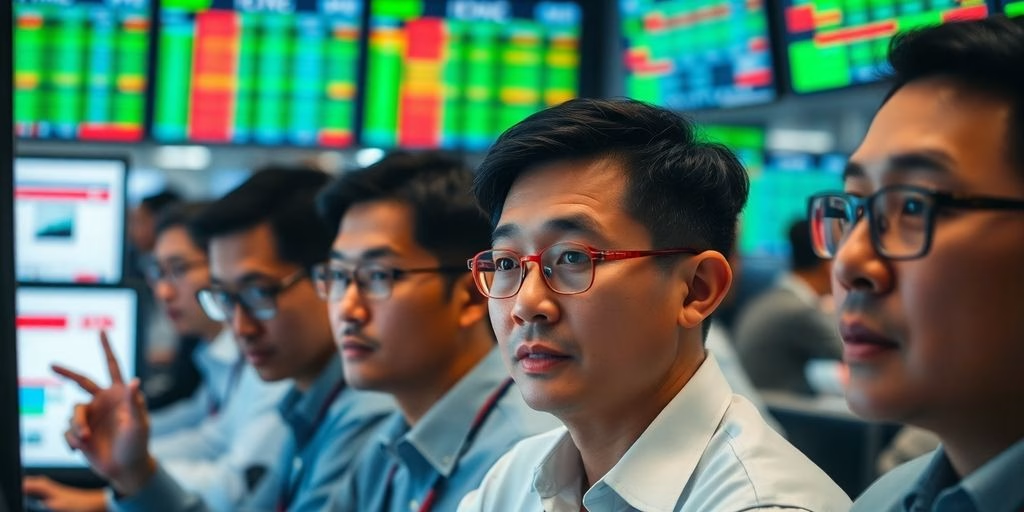Asian markets experienced a mixed trading day as investors weighed record gains on Wall Street against the impending expiration of U.S. President Donald Trump’s tariff reprieve. Economic data from across the Asia-Pacific region, including manufacturing PMIs and industrial output figures, also played a significant role in shaping market sentiment.
Asia-Pacific Markets React to Tariff Uncertainty and Wall Street Gains
Asia-Pacific markets displayed a mixed performance on Tuesday as the looming expiration of U.S. President Donald Trump’s 90-day tariff reprieve created uncertainty. U.S. Treasury Secretary Scott Bessent indicated that while some countries are negotiating in good faith, tariffs could "spring back" to previous levels if agreements aren’t reached. This cautious sentiment contrasted with the record gains seen on Wall Street, leading to varied outcomes across Asian bourses.
Key Market Movements
- Mainland China’s CSI 300: Rose 0.17% to 3,942.76, buoyed by a Caixin/S&P Global manufacturing PMI reading of 50.4 for June, exceeding the 49 predicted by analysts.
- Japan’s Nikkei 225: Fell 1.24% to 39,986.33, retreating after hitting an 11-month high in the previous session. The broader Topix index declined by 0.73% to 2,832.07.
- South Korea’s Kospi: Increased 0.58% to 3,089.65, with the small-cap Kosdaq adding 0.28% to 783.67.
- Australia’s S&P/ASX 200: Ended the day flat at 8,451.10.
- India’s Nifty 50 and BSE Sensex: Remained flat as of 1 p.m. Indian Standard Time.
- Hong Kong Markets: Closed for a public holiday.
Economic Data and Business Sentiment
Several key economic indicators influenced market activity:
- China’s Manufacturing PMI: The Caixin/S&P Global manufacturing PMI for June came in at 50.4, indicating expansion and surpassing expectations.
- Japan’s Manufacturing Activity: Rose in June for the first time in 13 months, with the au Jibun Bank flash Japan Manufacturing PMI reaching 50.4. However, demand remained weak.
- South Korea’s Manufacturing Activity: Contracted for the fifth consecutive month in June, with the S&P 500 Global South Korea Manufacturing PMI at 48.7.
- Japan’s Tankan Survey: Business sentiment among large Japanese manufacturers improved to +13 in June, up from +12 in March, according to the Bank of Japan’s quarterly survey.
Currency and Commodity Markets
- Asia-Pacific Currencies: Mostly appreciated against the U.S. dollar, with the dollar index falling 0.13% to 96.745. The Japanese yen strengthened 0.23% to 143.68, and the Indian rupee appreciated 0.11% to 85.59.
- Gold Prices: Australian mining stocks saw gains as spot gold appreciated 0.77% against the dollar to 3,328.58, driven by a weaker dollar and tariff uncertainties.
Corporate News
- Chiba Kogyo Bank: Shares surged over 25% on reports of a potential business integration with Chiba Bank.
- Xiaomi: Shares surged nearly 8% in Hong Kong following the launch of its new luxury electric vehicle, the YU7 SUV, priced competitively against Tesla’s Model Y.
- Li Auto: Shares plunged over 4% after the company reduced its delivery forecast for the second half of the year.
Outlook on Tariffs and U.S. Exceptionalism
Min Lan Tan of UBS Global Wealth Management noted that while the growth gap between the U.S. and the rest of the world will narrow, U.S. foundational strength remains intact. She anticipates tariffs to settle around current levels, with approximately 30-40% for China and 10-15% for other regions, leading to an overall U.S. tariff rate of about 15%.

